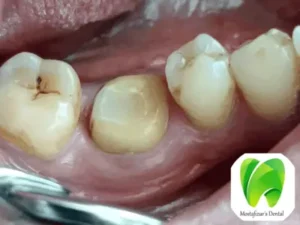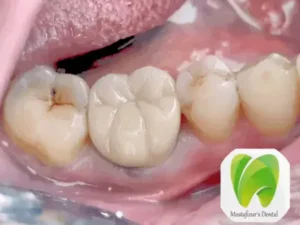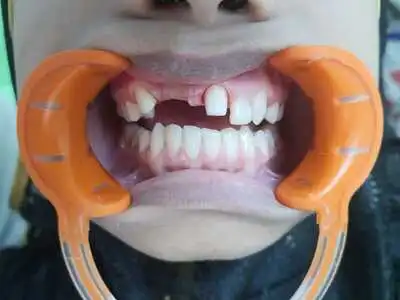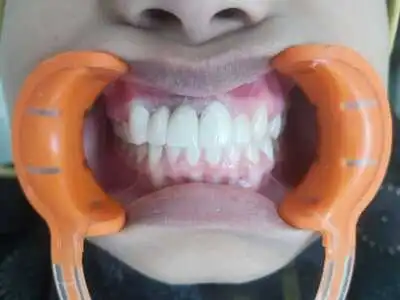Dental Bridge & Cap: Restoring Smiles at Mostafizur's Dental
Missing teeth or damaged smiles can impact not only your confidence but also your oral health. Fortunately, dental advancements offer solutions like dental caps and bridges to restore both aesthetics and functionality. At Mostafizur’s Dental, we are the leading provider of dental cap and dental bridge services in Bangladesh, dedicated to helping you achieve a healthy and beautiful smile.
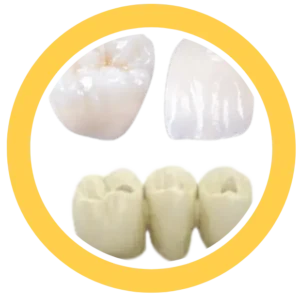
What is a Dental Cap?
Dental cap is also known as a crown. It’s a tooth-shaped hat that dentists use to fix broken, weak, or decayed teeth. The crown goes over your whole tooth for a strong fit. To make space, a tiny bit of enamel is removed. Crowns can be made from metal for strength, zirconia for durability and beauty, or porcelain to look natural. Also made of Gold for durability and tradition.
The Advantages Of Caps (Dental Cap Benefits)
Dental caps, also known as dental crowns, can significantly improve your oral health and smile. Here’s how:
Renewed Strength and Function
Cracked, broken, or worn teeth become weak and prone to further damage. Dental crowns act like a protective helmet, reinforcing the tooth structure and allowing you to chew comfortably without worrying about future breakage.
Enhanced Aesthetics
Discolored, chipped, or cracked teeth can bring down your smile’s confidence factor. Dental crowns are custom-made to perfectly match the color and shape of your surrounding teeth. This creates a natural-looking, seamless restoration that enhances your overall smile.
Post-Root Canal Protection (Dental Cap After Root Canal)
Root canal treatment removes the nerve and pulp from a tooth, leaving it more vulnerable. A dental cap placed over the treated tooth strengthens and shields it from fracturing.
Types of Dental Caps
The ideal dental cap material for you depends on your specific needs and preferences. Here’s a breakdown of some common materials used for dental crowns, along with their advantages and disadvantages, to help you make an informed decision with Dr. Md. Mostafizur Rahman Khandaker:
1. Porcelain Caps
Porcelain caps offer excellent aesthetics as they closely mimic the natural color and translucency of teeth. They are suitable for front teeth and provide a seamless blend with the existing dentition. However, they may be prone to chipping or fracturing under heavy biting forces.

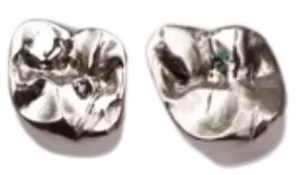
Metal Caps
Metal caps, often made of gold or silver alloy, are incredibly durable and long-lasting. They withstand biting forces well and require minimal tooth structure removal during preparation. However, their metallic appearance may be less desirable for visible teeth.
Zirconia Caps
Zirconia caps combine strength with aesthetics, making them an increasingly popular choice. They are highly resistant to fractures and offer excellent durability. Zirconia caps can be used for both front and back teeth, providing a natural-looking restoration.
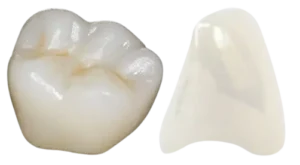

Gold Tooth Cap
Highly durable and corrosion-resistant, traditionally used for back teeth.
- Pros: Exceptionally strong and lasts a long time.
- Cons: The gold color may not be aesthetically pleasing for everyone and can be more expensive.
The Dental Cap Procedure at Mostafizur’s Dental
Getting a dental cap typically involves two appointments at Mostafizur’s Dental:
Consultation
Consultation with Dentist: Schedule a consultation with a qualified dentist, such as those at Mostafizur’s Dental. During this appointment, the dentist will assess your oral health, discuss treatment options, and address any concerns you may have.
Teeth Preparation and Impression Taking
Once you decide to proceed with a dental cap, the dentist will prepare the affected tooth by removing a portion of its outer surface to accommodate the cap. Impressions of your teeth will be taken to ensure a precise fit for the cap.
Temporary Cap Placement
While your permanent cap is being fabricated in a dental laboratory, a temporary cap may be placed over the prepared tooth to protect it. This temporary cap will remain in place until your next appointment.
Permanent Cap Fitting and Adjustment
Once the permanent cap is ready, you will return to the dentist’s office for its placement. The cap will be carefully fitted and adjusted to ensure proper alignment and bite function. Any necessary adjustments are made to achieve optimal comfort and aesthetics.
Cost of Dental Caps in Bangladesh
The cost of a dental cap depends on factors like the material used and the complexity of the case. We offer a general price range during consultations, but a personalized estimate can be provided after examining your specific needs.
What is a Dental Bridge?
To fix gaps left by missing teeth, dentists use dental bridges. These are fixed restorations that act like a bridge, anchoring artificial teeth to your natural ones on either side of the space. It consists of artificial teeth (pontics) held in place by crowns placed on the surrounding healthy teeth. These dental crowns are the foundation of the bridge. They are cemented onto your natural teeth on either side of the gap, providing stability and support for the artificial teeth. Dental bridges restore the ability to chew effectively, improve speech, and enhance the aesthetics of your smile.

Advantages of Dental Bridges (Dental Bridge Benefits, Fixed Teeth Bridge)
Dental bridges offer several advantages for your oral health and smile:
Restore Ability to Chew and Speak Effectively
Missing teeth can make chewing difficult and can slur your speech. Dental bridges restore the natural biting surface and tooth structure, allowing you to chew comfortably and speak clearly.
Improve Facial Structure and Prevent Sagging
Missing teeth can lead to facial sagging over time. By replacing missing teeth, dental bridges help maintain the natural shape of your face by supporting the surrounding facial tissues.
Enhance Smile Aesthetics by Filling Gaps (Dental Bridge Front Teeth)
Gaps in your smile can affect your confidence. Dental bridges, especially those made with natural-looking materials like porcelain, can restore a complete and aesthetically pleasing smile, even for front teeth.
Types of Dental Bridges
There are several types of dental bridges to suit different needs. Dr. Mostafizur Rahman Khandaker can help you determine the best option for your situation:
Traditional Bridges (Most Common)
These are the most common type of bridge. They consist of crowns placed on the healthy teeth on either side of the gap, with a pontic (artificial tooth) in between. Traditional bridges are typically used to replace one or more missing teeth and offer excellent stability and durability. (Target keyword: 3 unit dental bridge)
Cantilever Bridges
These bridges are used for single missing teeth with healthy teeth on only one side of the gap. A crown is placed on the healthy tooth, and a cantilever extends out to support the pontic. While less common than traditional bridges, cantilever bridges can be a good option in certain situations.
Maryland Bridges
These bridges are primarily used for front teeth. Instead of crowns on the adjacent teeth, they use metal wings that are bonded to the back of the teeth. Maryland bridges are a conservative option for replacing front teeth but may not be as strong as traditional bridges.
Procedure for Getting a Dental Bridge
Getting a dental bridge typically involves multiple appointments at Mostafizur’s Dental:
Consultation
During your initial consultation, Dr. Khandaker will examine your teeth, discuss your concerns, and determine if a dental bridge is the right treatment for you. X-rays will likely be taken to assess your jawbone health.
Teeth Preparation for Crowns
The teeth on either side of the gap will be prepared for crowns by removing a small amount of enamel. This ensures the bridge fits properly and looks natural.
Impression Taking and Bridge Fabrication
After numbing the area, impressions will be taken of your teeth to create a precise mold for the bridge. The bridge will then be crafted in a dental lab using the chosen materials.
Temporary Bridge Placement (Optional)
A temporary bridge may be placed while your permanent bridge is being fabricated. This helps protect the prepared teeth and maintain your smile aesthetics.
Permanent Bridge Placement and Adjustment
During your final visit, the permanent bridge will be carefully placed and checked for fit, bite, and color. Any necessary adjustments will be made before permanently cementing the bridge in place.
Cost of Dental Bridges in Bangladesh
The cost of a dental bridge in Bangladesh can vary depending on several factors, as explained by Dr. Mostafizur
Number of Teeth Replaced
The number of teeth involved in the bridge (both pontics and crown placements) will influence the overall cost.
Material Used
The type of material used for the crowns and pontics affects the price. Generally, bridges made with zirconia or all-ceramic materials are more expensive than those made with PFM (porcelain-fused-to-metal).
To get a personalized cost estimate for your dental bridge, a consultation with Dr. Md. Mostafizur Rahman Khandaker is recommended. Similar to dental caps, the cost of a dental bridge depends on the number of teeth involved and the material used. We can provide a general price range during consultations, and a more precise estimate after a thorough examination.
What People Asked
Missing or damaged teeth? Dental caps and bridges at Mostafizur’s Dental can restore your smile and oral health. Dentist Md. Mostafizur Rahman Khandaker offers personalized consultations to find the best solution for you.
What are dental caps used for?
Dental caps, also known as crowns, serve several purposes:
Restore strength and function to damaged teeth (cracked, broken, worn). Improve the aesthetics of teeth with chips, discoloration, or poor shape. Protect teeth after root canal procedures.
What is the difference between a crown and a cap?
There is no difference! Dental cap and dental crown are interchangeable terms used for the same restoration.
Is a tooth cap permanent?
Dental caps are not permanent, but they are very durable and can last for many years (5-15 years) with proper care.
Is tooth capping painful?
The procedure itself shouldn’t be painful because local anesthesia is used to numb the area. You might experience some mild discomfort afterwards, which can be managed with over-the-counter pain relievers.
How long can a tooth bridge last?
With proper care, dental bridges can last for 10 years or even longer.
Are bridges better than implants?
Both bridges and implants are effective solutions for replacing missing teeth, but they have their pros and cons. Bridges are generally less expensive than implants, but they require altering healthy teeth for support. Implants are a more permanent solution that don’t affect surrounding teeth, but they typically involve a more complex surgical procedure. Consult with a dentist to discuss which option is best for your specific needs. (Target keyword: dental bridge vs implant consultation)
Is tooth bridge placement painful?
Similar to dental caps, the bridge placement procedure itself shouldn’t be painful due to anesthesia. You might experience some temporary discomfort afterwards, which can be managed with medication.

